Stronger Bodies, Stronger Minds
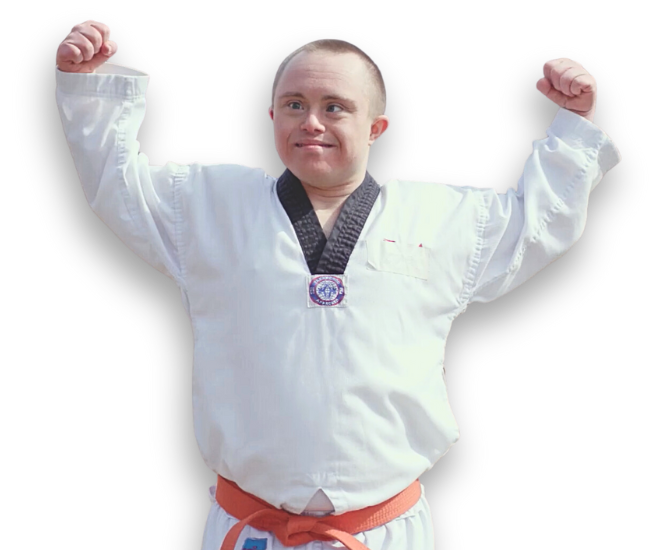
Welcome to the Mindsets Wellness Program
Preregistration is open!
Welcome to the Mindsets Wellness Program! Joining Mindsets is your first step towards building healthy habits that focus on fitness, nutrition, and self-care. This free program was designed based on the results of the Mindsets Study to give adults with Down syndrome the life skills and habits needed for a healthy, active, lifestyle into adulthood and throughout aging.
Through the Mindsets Wellness Program, participants will:
- Build a weekly exercise routine by following the recommended exercises
- Learn new sports and activities with the Mindsets Mentors one-to-one videos
- Improve your cooking, meal preparation, and meal planning skills with beginner-level recipes
- Learn exercises and tips for managing your mental health
- Stay motivated by tracking your progress in the app
- Work towards your Mindsets Milestones to turn your new routines into long-lasting habits!
- Coming in 2025: Play cognitive games that enhance memory, focus, and concentration
If you or someone you know is interested in joining, please preregister by providing your information below.
Preregister for Mindsets Wellness Program
Sneak Peek of The Mindsets App
When you join Mindsets, you’ll receive free access to the Mindsets Wellness Program App. By using this app a recommended 3 times per week for at least 8 weeks, you can start to establish healthy habits in fitness, nutrition, and mental health.
Take a sneak peek of a few of our favouite features.
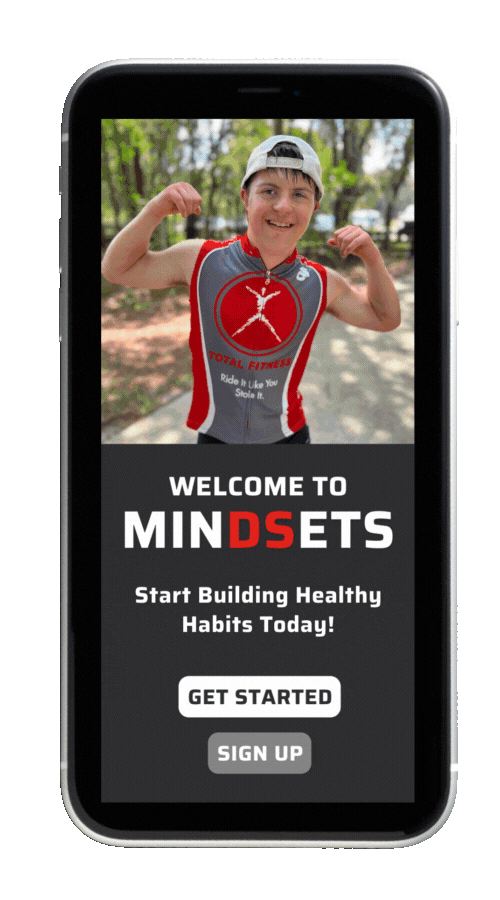
Goals and Progress Tracking
The first time you login to the Mindsets app, you’ll be asked some simple questions about your current routines and health. This will help the app to track your progress as you build your healthy habits and work towards your Mindsets Milestones.

Guided Weekly Activities
In order to form healthy habits that last, we recommend usig the app 3 times a week for a minimum of 8 weeks to start. You will find a new list of activities already picked for you each time you login, so all you have to do is start! If you do not like an activity or have already done it, you can switch it for another option.
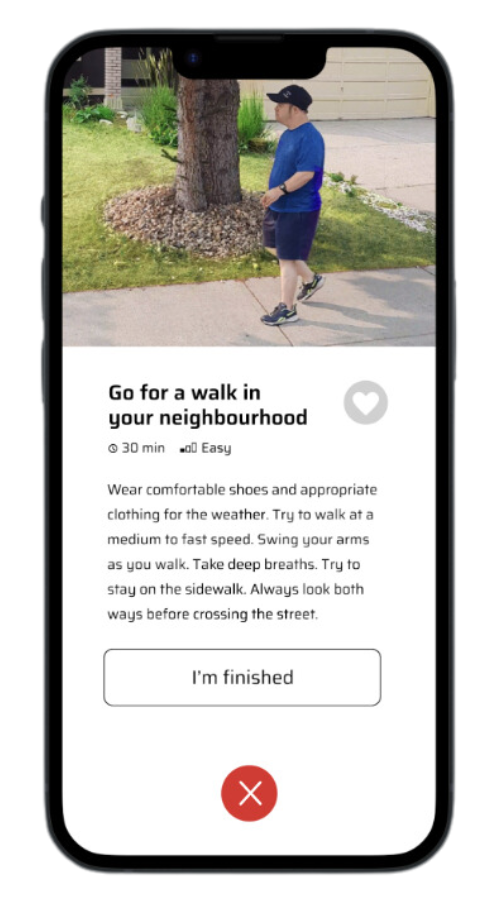
Recommended Exercises
The first step in your activities for the day is exercise! Based on the results of the Mindsets study, exercising for 20 minutes three times a week can improve your physical health and even your cognitive functions like short-term memroy and decision making. Explore these recommended exercises and slowly build your own weekly fitness routine that will help you get moving.

Mindsets Mentors Videos
Discover a new sport of activity that you love with your Mindsets Mentors! Athletes in the Down syndrome community from across North America have shared some of their favourite sports with you in these peer-led instructional videos. Try playing basketball, going for a swim, rock climbing, figure skating, training for a triathlon, weight lifting, and more! Learn more about your Mindsets Mentors.
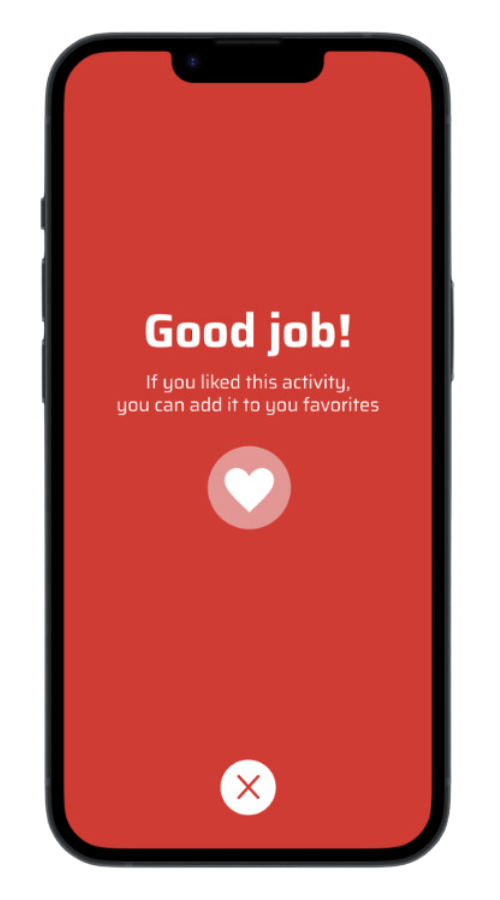
Save Your Favourites
Did you find an exercise, video, or recipe that you really love? Save it to your favourites and start creating your own collection of the activities you like best.
Meet Your Mindsets Mentors
Try a new sport or activity with your Mindsets Mentors! Choose from a library of one-to-one videos with these experienced athletes across North America. Discover rock climbing with Wyatt, figure skating with Meg, weight lifting with Kyle, or running with Abigail!

Kyle Landi
Weight Lifting
Kyle Landi is the first competitive bodybuilder with Down syndrome in Canada, taking the stage at many international events. When he isn’t competing, Kyle is working hard in the gym with his stepfather Joe and other professionals to push himself and his body to new limits.

Meg Ohsada
Figure Skating
Meg has been an athelete from a young age, winning several Special Olympic medals for her figure skating routines. Sometimes finding the right words to say is hard. That’s why Meg likes to express herself through her creative choregography and music selections.

Aaron Waddingham
Taekwondo
Aaron is a martial artist, recently achieving his yellow belt in Taekwondo. Discipline, strength, and flexibility are all required to master the kicking and punching techniques. Aaron shows the same confidence in the dojang as he does while acting!

Wyatt Smuszko
Rock Climbing & Basketball
Wyatt is always up to try new sports and activities! That’s how he likes to stay active and meet new people. Wyatt has played basketball for many years, and has recently taken up the new challenge of rock climbing to help build strength and confidence.
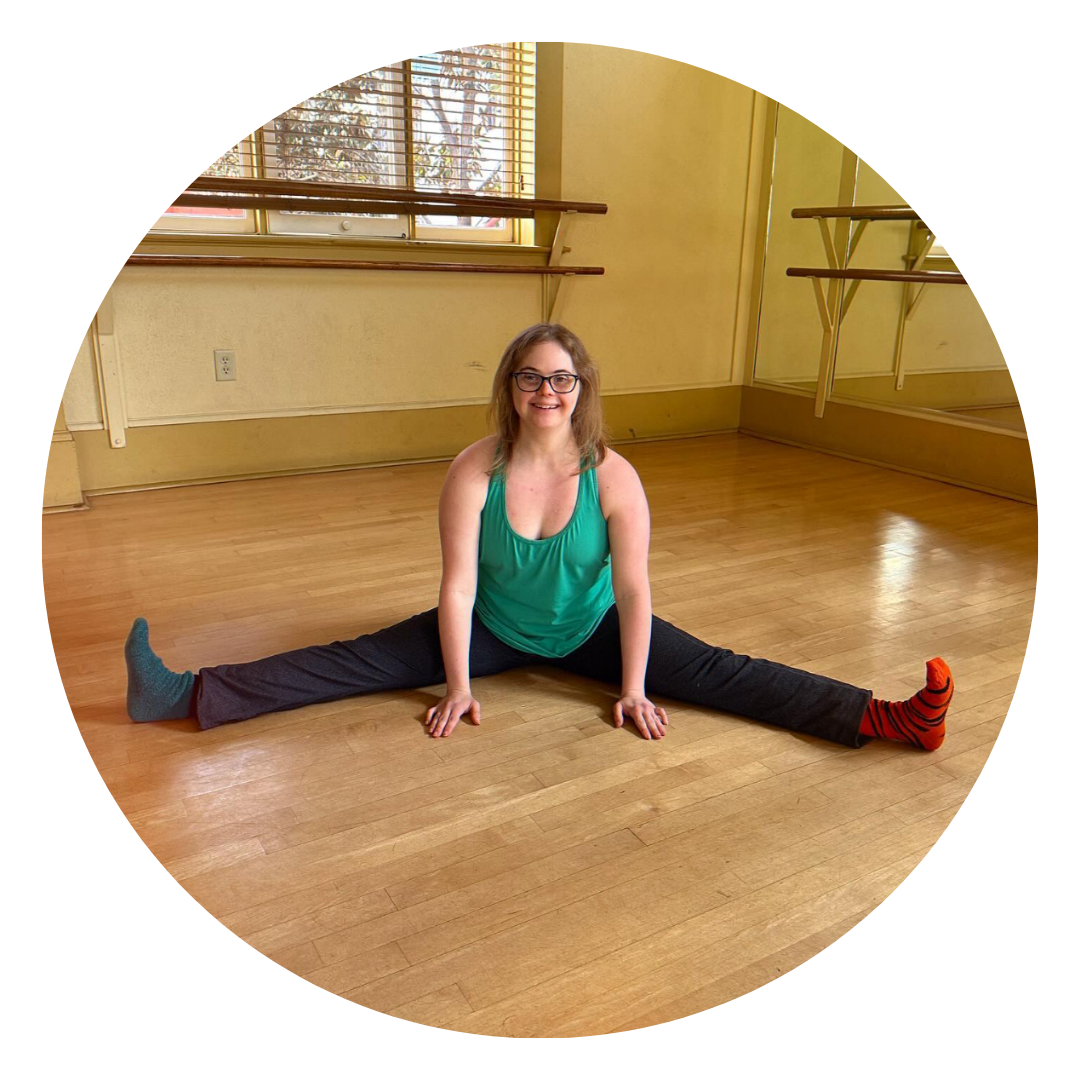
Jessica Parsons
Yoga
Jessica is a yoga instructor who has been practicing almost her entire life thanks to her mother, Sue Anne. Jessica is a community leader, teaching an inclusive yoga class at a local community center to help others build strength and confidence.

Abigail Adams
Triathlon
Abigail the Advocate is an accomplished triathlete and public speaker. She is the first woman with Down syndrome to complete a sprint triathlon, swimming 440 yards, riding 10.2 miles, and running 5K, and has since finished over 15 of them.
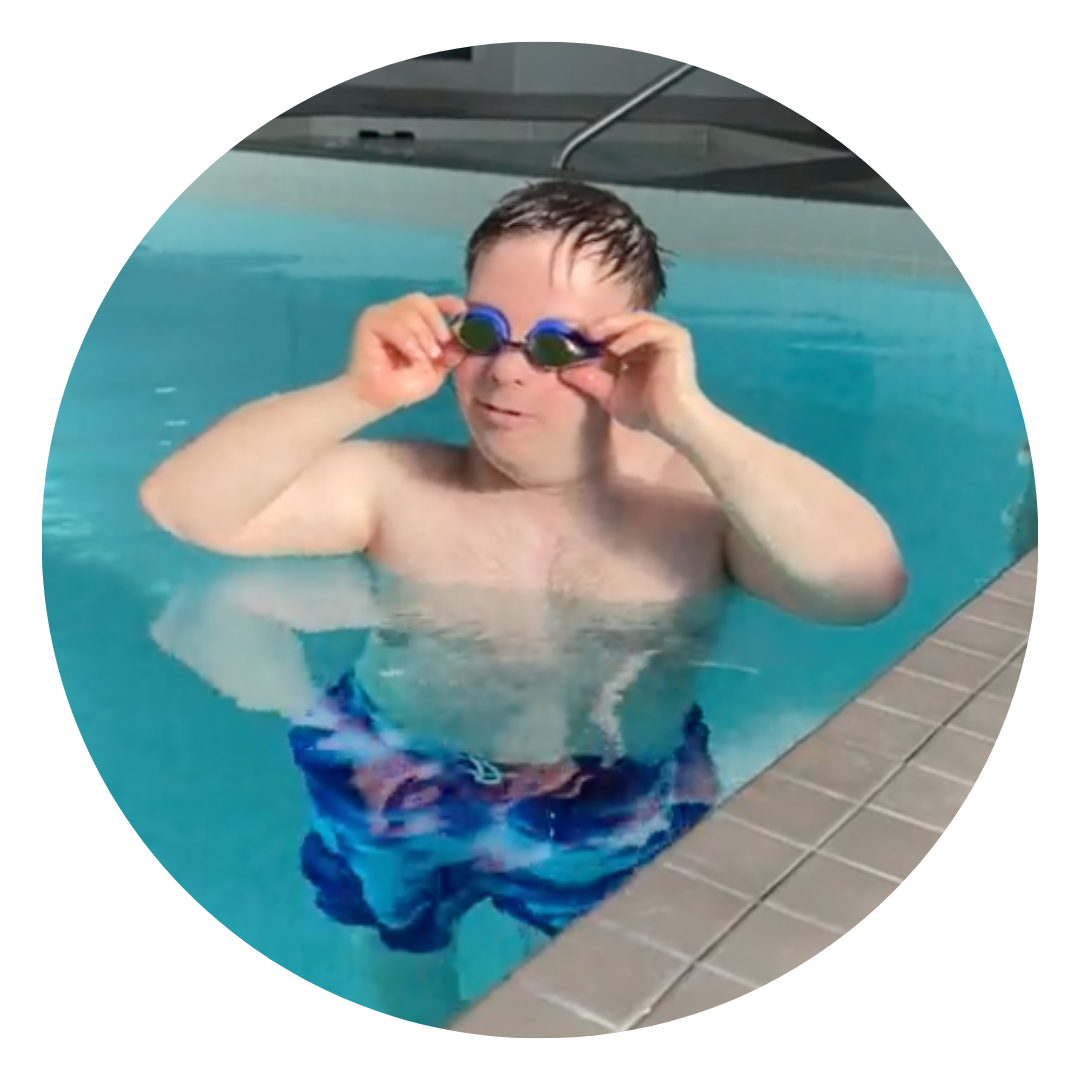
Paul Sawka
Swimming
When Paul isn’t busy as our Awareness Leader, he’s in the pool or playing baseball! Paul has been swimming for many years, competing in the Special Olympics and as a long-time member of the Calgary Dolphins Swim Club.

Julia Lane
Crossfit
Julia is a multisport athlete and public speaker who is excited to try anything including rowing, swimming, and CrossFit! She holds two gold medals and a bronze in the CrossFit Games Adaptive ID and recently took home 5 medals in swimming at the Special Olympics.
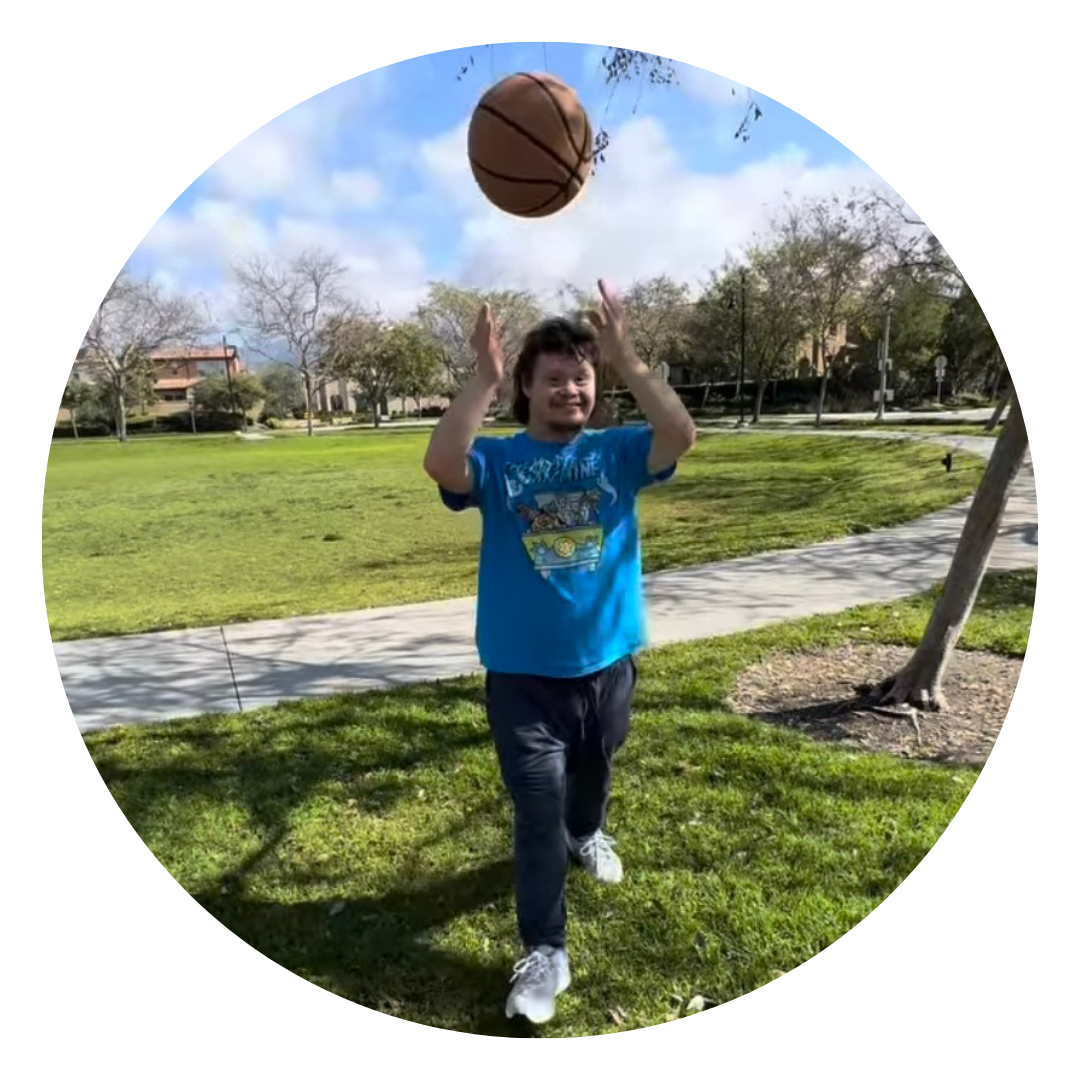
Tyler and Eli
Basketball
Learn how to shoot hoops with this awesome duo, Tyler and Eli. These brothers use their large social media following and love of basketball to advocate for inclusion for people with disabilities. Tyler is famous for sinking some very impressive three-pointers!
New Mindsets Mentors and activities will be added to the program often, so you’ll always have something new to try!
Mindsets Study
The Link Between Exercise and Cognition
In 2020, the global research study Mindsets began seeking the answer to a really simple yet important question that no one had ever asked, can physical activity benefit cognitive processing for an individual with Down syndrome?
This research study by Dr. Dan Gordon of Anglia Ruskin University is a missing piece of the puzzle for the Down syndrome community. The data collected plays a vital role in guiding the Mindsets Wellness Program and improving the quality of life for people with Down syndrome throughout adulthood and aging.
How was The Mindsets Study Data Collected?
With the support of BrainHQ, we launched an 8-week research study facilitated by Dr. Dan Gordon from Anglia Ruskin University. Our goal was to scientifically quantify how much physical exercise affects mental fitness for individuals with Down syndrome.
Over 80 individuals participated in the two-year study. Depending on their role in the study, participants performed physical exercises from home, like light stationary biking or light jogging, as well as mental exercises and brain games provided by BrainHQ.
Dr. Dan Gordon and his team of researchers used this data to measure the precise impact exercise has on cognition over time, showing that the combination of light exercise and cognitive exercises can lead to improved information processing and attention after just eight weeks.





“I am a firm believer that exercise helps people with Down syndrome, but we need to continue to prove it. And the way we do that is with good research.”
Dr. Brian Skotko, MD, MPP, Director, Down Syndrome Program Mass. General Hospital
Mindsets Key Findings

Researchers noted a significant improvement in speed and accuracy of decision making for the exercise-only group, the cognitive training group, and the combined group.

Results suggest that exercise should be adopted within the Down syndrome community to promote physical and cognitive
well-being.

Researchers found a significant reduction in errors and an increase in correct responses in a series of cognitive and executive function exercises in those who exercised.
“Improved cognitive function can lead to increased quality of life, which is important given this is the first generation of people with Down syndrome who will generally outlive their parents.”
Dr. Dan Gordon, Associate Professor in Cardiorespiratory Exercise Physiology at Anglia Ruskin University and Senior Author of The Mindsets Study
Mindsets Study FAQ
Who were the participants in the study?
Why did CDSS conduct this study?
This study was conducted to collect the data necessary for creating an effective wellness program and to establish a link between exercise and cognitive ability for people with Down syndrome. The goal of publishing this research is to improve the quality of life for people with Down syndrome by encouraging an active lifestyle.
What is CDSS going to do with this information?
What does this study mean for individuals with Down syndrome?
Who were the researchers?
Support the Mindsets Wellness Program
Make a donation to CDSS today to support the Mindsets Wellness Program and give Canadians with Down syndrome the opportunity to build a a healthy, active lifestyle.
